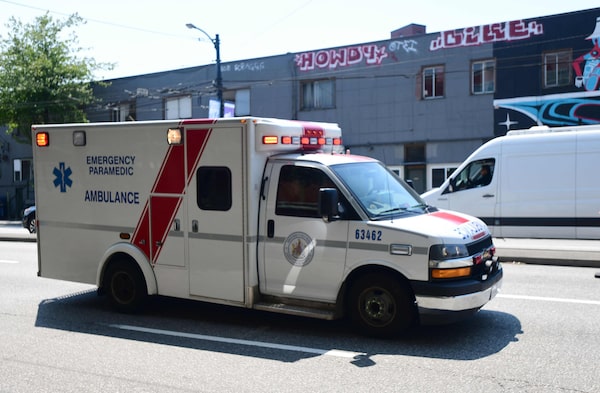
An ambulance on duty during the extreme hot weather in Vancouver on June 30, 2021.DON MACKINNON/AFP/Getty Images
British Columbia’s Health Minister is promising changes to the understaffed ambulance service after the province’s emergency response system failed hundreds of people during an unprecedented heat wave.
On Tuesday, Adrian Dix told reporters at a news conference that improvements will be announced Wednesday to the body overseeing the province’s more than 4,500 paramedics, emergency call takers and dispatchers after 777 sudden deaths were reported during last month’s “heat dome” – which is nearly four times the average number of people that died during this period in recent years.
Premier John Horgan said again Tuesday there was no way to prepare for such “a-once-in-a-1,000-year” event, but conceded authorities should have been better prepared, and he promised they will be as the unseasonably hot summer continues.
B.C’s chief coroner is in the midst of analyzing the deaths for patterns and, in the coming weeks, will issue a report into how and why so many perished amid the heat.
B.C. heat wave highlights growing power of science to discern human influence on extreme weather
The paramedics’ union points out B.C. has spent years predicting a major earthquake and this recent crisis has revealed massive systemic flaws with the system, including understaffing, poor leadership and working conditions unattractive to recruiting new hires, as well as the high levels of burnout among the workers on the front lines of multiple public-health emergencies.
Family members of those who died said they had difficulty getting an answer when they dialled 911 and waited hours to get an emergency worker to attend to their loved ones.
Maura De Freitas’s stepbrother, Kevin Butler, was one of the hundreds who died between June 25 and July 1 during the record-breaking heat wave in which temperatures in the province reached as high as 49.6 C in Lytton, where a fire destroyed the village and killed two residents.

Kevin Butler on a False Creek ferry in Vancouver. Butler died June 29, 2021, at 68 years old.Supplied
Mr. Butler, 68, had autism and had been living at Renfrew Care Centre in Vancouver. He used to live with Ms. De Freitas and worked as a dishwasher, until health complications caused him to become paraplegic and need constant care.
Renfrew Care Centre, like many residential units in the province, didn’t have an air conditioning unit the week of the heat wave, Ms. De Freitas said. There was a fan, and Ms. De Freitas purchased an additional fan for her stepbrother’s room, which she later donated to the home.
Mr. Butler was ill during the heat wave, and on June 28, staff called for an ambulance to take him to a nearby hospital. It took 10 hours for one to arrive, Ms. De Freitas said.
“Something definitely has to be done here,” she said. “It’s very distressing as a family member to know that he suffered so.”
When she arrived at the hospital, she learned from a doctor that Mr. Butler had heat stroke, and may have had a brain bleed and a minor heart attack. He died the night of June 29.
“I wish I had the opportunity to take him out in his wheelchair, just to feel the sun on his face,” she said. “For two years, he hasn’t been outside.”
The BC Coroners Service said it has not confirmed all of the 777 fatalities were caused by the extreme heat. The number is nearly four times the average for the same time period in the previous five years.
More information about the fatalities – such as where they occurred and which populations were most heavily affected – will not be available for several weeks as the coroner’s office continues its investigation, spokesman Ryan Panton said in an e-mail. But, he added, anecdotally it appears that many of those deaths were among seniors living alone during the heat wave.
Isobel Mackenzie, the provincial Seniors Advocate, said the province should compile a list of everyone 80 and older who is living alone to single out those with less support who may need to be checked on – over the phone or in-person – during the next heat wave. Authorities also need to create benchmarks for identifying when the heat is making people uncomfortable versus being a potentially dangerous and fatal event.
Extreme heat can be very dangerous for seniors, whose bodies can’t tolerate drastic temperatures very well, said Terry Lake, chief executive officer of BC Care Providers Association. Seniors with cognitive deficiencies may not even be aware they’re suffering from heat stroke or heat exhaustion, which is why people who live alone are particularly vulnerable as temperatures soar.
Mr. Lake, a former provincial health minister under the last Liberal government, said seniors tend to be safer in retirement homes and care settings since staff check in on them. During the heat wave, staff could make sure residents were hydrated, had cool towels, and notice if a resident needed medical attention. Still, he acknowledged many homes in B.C.’s Lower Mainland didn’t have air conditioning units since it’s unusual for temperatures to rise that high in the summer.
Before Mr. Dix’s news conference Tuesday, his staff acknowledged in an e-mailed statement the province’s ambulance service has “to do better,” and attributed its struggles to “a decade of underinvestment by the previous government.”
On Tuesday, Mr. Horgan, who has been in power for four years, partly blamed the deaths on the dysfunctional system inherited from the former Liberal government and said the New Democrats have since invested in more paramedics and ambulances.
To date, there hasn’t been nearly enough done, according to Troy Clifford, president of the Ambulance Paramedics of BC union, who said up to a quarter of his members are now seeking mental-health treatment after a critical incident on the job, are off getting treatment from physical injuries or are in the process of filing a worker’s compensation claim because of the pressures of their workplace.
Another major problem with the response, he said, was Emergency Health Services did not activate its more serious crisis protocols until the fourth day of the heat wave – at which point using its new range of tools to increase staff accordingly was moot.
Mr. Clifford, who has been meeting with the Health Minister since last week, said he is optimistic Wednesday’s announcement will lead to more hiring and the changing of an on-call system for new recruits that penalizes them with $2-an-hour pay while they await being dispatched in remote areas.
Many people in the province reported hours-long wait times for an ambulance during the heat wave, and have criticized the government’s handling of the crisis.
Savita Ahuja’s 71-year-old father, Gian Goel, died June 27 while waiting 90 minutes for an ambulance to arrive. Mr. Goel, who lives in Surrey, wasn’t feeling well that day and kept sleeping and waking up. In the evening, his wife realized he had a fever. She called for an ambulance around 7 p.m., and then called her son and daughter-in-law, who’s a nurse. Soon after, they had to start performing CPR on him.
Ms. Ahuja’s mother ran outside and started screaming for help, prompting her neighbours to call 911 again. Still, the ambulance didn’t arrive until a little after 8:30 p.m. Ms. Ahuja, who is in India on sabbatical, said if the ambulance had arrived earlier, her father would still be alive.
“We have to change how the system works,” Ms. Ahuja said. “We can’t let this happen to any more people.”
Ms. Ahuja said her father was her best friend – they used to talk each day, and he was planning a trip to visit her in India next month. She said he was funny and dependable.
Years ago, when Nickelback was just a young garage band in Langley, they approached Mr. Goel, who worked with computers, and told him they needed a computer to make music but couldn’t afford one. He made them one and said they could just pay him back in monthly installments, Ms. Ahuja recalled.
“He would do just about anything for anyone,” Ms. Ahuja said. “He was always helping people.”
James Liebenberg, president of West Coast Seniors Housing Management, which operates the care centre that housed Mr. Butler, said he couldn’t comment on an individual’s medical history. But he said staff across the 24 homes the company operates worked during the heat wave to ensure residents were hydrated and cared for.
Mr. Liebenberg said while some of the homes the company operates have air conditioning, they’re only in certain rooms because the buildings were built before these extreme weather conditions. He said it is critical to increase funding for care home staff, as well as infrastructure to install and maintain air conditioning units.
“I really hope that we as a society ... will express that concern for seniors in our willingness to invest in this industry to help them,” Mr. Liebenberg said.
Mr. Butler died after a year of limited contact with his family because of COVID-19 pandemic restrictions. Ms. De Freitas said she had noticed the isolation had caused Mr. Butler’s cognitive well-being to decline, and tried to send him postcards and small gifts to cheer him up.
“I don’t even know if he was registering it,” she said. “But you know, I had to do something.”
In the days following her stepbrother’s death, Ms. De Freitas reflected on her joyful moments with him. Mr. Butler loved country and western music, and enjoyed watching hockey, car racing and baseball. His stepsister said he was a “very sweet and a very gentle soul” who “felt very deeply.”
“It was such a privilege to walk beside him,” Ms. De Freitas said. “My life was enriched.”
We have a weekly Western Canada newsletter written by our B.C. and Alberta bureau chiefs, providing a comprehensive package of the news you need to know about the region and its place in the issues facing Canada. Sign up today.
 Mike Hager
Mike Hager